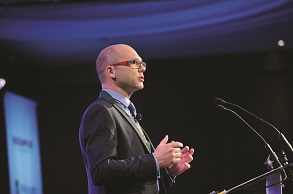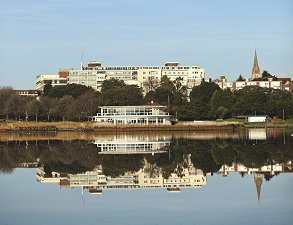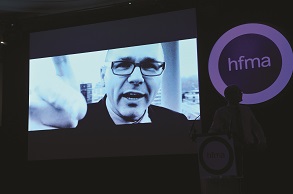Feature / Everyone counts
Mark Orchard, HFMA’s new president (right), wants the HFMA to become a one-stop shop for its members. That’s the core of his theme for the year – Everyone counts. He is clear that the demand on NHS services has never been greater. And with austerity creating specific challenges for the 20,000 strong NHS finance community, he says the association needs to ensure it provides support across its whole membership.

Mr Orchard, director of finance at Poole Hospital NHS Foundation Trust (right), took over the presidential role from Shahana Khan at the HFMA annual conference in December. The conference programme included all the key system leaders and health service commentators and left delegates in no doubt about the scale of the current challenge.
Put simply, rising demand coupled with inflation is outstripping increases in healthcare funding. Mr Orchard says he is well aware of the challenges facing the NHS and the finance community. The service is already struggling in 2016/17 with spending review resources frontloaded (a 3.7% real-terms increase in England). But from April, increases become far less generous (1.3% in 2017/18 and 0.3% in 2018/19) as the service enters the so-called funding ‘u-bend’.
These pressures are being felt across the whole NHS. Although local contexts can be different – depending on historical funding and structures – the challenges are similar. In Dorset, for example, – Mr Orchard’s local health economy – the health system is aiming to rebalance acute and community services to close an estimated £229m deficit by the end of 2020/21 (see box below). It requires change and productivity improvement on an unprecedented scale.
The finance function will need to be at the heart of meeting this challenge and will be under significant pressure to deliver. That’s why Mr Orchard wants to make sure the HFMA is providing the right support across the whole function and the whole UK health service. That support cannot just be at director level, or focused on just the English service; it needs to be at all levels of the function and UK-wide.
‘Given the challenges we face, the association and its members need to support everyone across our unique network, irrespective of: which bit of the devolved NHS they work within; whatever level they are working at; whether qualified or unqualified; and certainly irrespective of gender and ethnic background,’ he says. Every member of the function has a role to play and he is determined that ‘every single member feels valued’.
He insists the HFMA is ideally positioned to help finance teams share best practice and solutions to common problems. In particular, he thinks the four UK health systems can do more to learn from each other.
‘Northern Ireland and Scotland have very different, but equally valid, experiences of integrating health and social care,’ he says. ‘Wales has moved beyond the NHS internal market we still cling to in England, despite a new emphasis on system collaboration. England has made some great progress on costing. So, despite our different starting points, I believe there is more we can do at the HFMA to facilitate learning and sharing between and across all four nations. We will find practical ways of making that happen during my year.’
The approach to commissioning is a good example. The activity – understanding the needs of local populations and ensuring services are in place to meet them – remains vital and each UK health system has to undertake this. But it is achieved in a variety of ways. Has the English approach become too transactional? Does the lack of a direct link between activity outcomes and payment outside of England undermine initiatives to improve cost at service line level?
There will be pros and cons to each approach, but Mr Orchard believes the association, with branches and members in all four nations, is well placed to ‘facilitate learning’ and discuss the relative merits. Different approaches to health and social care integration is another potential area that could benefit from more comparative analysis and discussion. While determined to improve communication and cross-fertilisation of ideas across the four nations, he also wants to build on the association’s links with the US and Australia. But he wants to explore how technology could help connect core memberships of healthcare finance bodies, rather than relying on presidential engagement.
All HFMA presidents face a busy HFMA programme alongside their senior substantive roles. And Mr Orchard is pragmatic about what he can do over the next year. ‘Let’s be absolutely honest – I’ve got a day job and that comes with a control total and a whole bunch of other things to deliver on. And that’s no different to any other finance director in the service,’ he says. ‘So my prime focus has to be ensuring that, in my case, the Dorset system continues to deliver for local patients and service users. That said, when it comes to my HFMA year, I will prioritise my HFMA time with a bias towards getting out to the branches.’
Branches are the ‘lifeblood’ of the HFMA, he says. The association benefits from widespread contributions from members, sitting on committees and special interest groups, for example. But for many members, the branch represents their whole direct engagement with the HFMA. Mr Orchard wants to ensure branches get the right recognition and he’ll contribute to this by ensuring he visits every branch in 2017.
While getting around the country, he wants to listen to and learn from members – how is the association supporting members locally and what more could it do centrally to support local activity? – and feed this back into the support programme the association provides.
HFMA members are also likely to be more aware of the association’s national board, which will be more visible, says Mr Orchard. New additions will cement links between the HFMA and the Future-Focused Finance (FFF) initiative. Mr Orchard was national lead for the improvement programme when it was set up three years ago (while he was finance director for NHS England’s Wessex area team). The initiative owes a lot to Mr Orchard’s vision and drive and it is no coincidence that his theme for the year as HFMA president – Everyone counts – closely resembles the FFF overall aim of Making people count.
Caroline Clarke, finance director at the Royal Free London NHS Foundation Trust and senior responsible officer (SRO) for the FFF value workstream, has joined the HFMA board. And so has Sanjay Agrawal, SRO for FFF’s close partnering work. A consultant respiratory intensivist at University Hospitals of Leicester NHS Trust, Dr Agrawal also represents the HFMA’s first ever clinical member of the HFMA board.
The HFMA has long championed clinical-financial engagement and Dr Agrawal’s appointment is a further demonstration of this commitment, underlined by plans to establish a new HFMA clinical forum alongside a new social care faculty (in partnership with CIPFA).
With plans for an HFMA app to deliver member services and the start of the association’s qualifications programme (see page 22), there’s a busy year ahead. And Mr Orchard is determined to make it count.
Collaborative solution
The Dorset health economy – with three district general hospitals, a community and mental health provider and a single clinical commissioning group – faces all the same challenges as the UK health system as a whole.
At Poole hospital (pictured right) Mr Orchard has worked
(pictured right) Mr Orchard has worked
with local NHS leaders to devise a system approach to these challenges. The Dorset sustainability and transformation plan (STP) estimates that, with no change, the system will have a £229m deficit by 2020/21. Its proposed solution has three strands: prevention at scale; integrated community services; and a single acute network with, potentially, significantly revised roles for the county’s three district general hospitals.
But more fundamental than this, Mr Orchard says there needed to be a system-wide recognition of the near-term reality of the financial position – there is no additional money – and that old transactional-based contracting arrangements would no longer work.
Instead, the Dorset STP translated this into a financial framework for the next two financial years, enabling the bodies involved to focus on planning for operational delivery within available capacity from next year.
Mr Orchard says a new two-year single collaborative agreement, starting in April, for the first time ‘contractually commits individual organisations to work in the joint interest of the whole system in terms of funded capacity and demand management’.
It committed to initial programmes of work, requiring delivery in January and February, so that the collective system will be best placed to deliver in the years ahead. All agreed actions will be tracked on a system scorecard, with transparent key performance indicators to enable system partners to hold each other to account and take corrective action where needed.
This will be reported at appropriate intervals to the Dorset system leadership team. The information will also form the basis of how delivery will be reported to NHS England and NHS Improvement.
‘Clearly, the significant work begins now, but our joint ambition is that by working together we will be able to continue to deliver services across Dorset that best meet the needs of our local patients and service users,’ he says.
For Poole this means a sizeable 4.7%, or £11m, cost improvement programme during 2017/18.
All parties recognise how demanding this efficiency is – for example, exceeding Poole’s current year CIP target of 3.9%.
But there have been upsides to the new collaborative approach. ‘We’ve never before had the certainty of agreeing the financial parameters that early in the year [October], and that really focuses the mind quickly on the actions needed,’ says Mr Orchard.
‘By the time we submitted our draft plan at Poole, clinical directorates had already identified £5.4m CIPs and by the final plan, we had another £2.6m of pipeline schemes. But this still leaves a significant £3m of CIP unidentified and a scale of challenge that this hospital has not seen historically.’
The whole system is now focused on addressing demand – and ensuring it is met by services at the right time and in the right place. The plans are based on activity being contained within the forecast 2016/17 levels, despite the trend suggesting increases effectively across the board (over 4% for elective and non-elective inpatients, for example).
The flat activity target relies on quick wins – delivering best practice in referral management, reducing low value procedures and implementing RightCare and the Getting it right first time orthopaedic programme.
Mr Orchard believes the collaborative approach offers the best chance of success – and early progress has been good – but he says achievement of the efficiency targets will be demanding. The full-year effect of significant reductions in agency staff costs – from £526,000 in April (well above the £370,000 monthly spend implied by the trust’s agency staff cost ceiling) to £263,000 in November provides a good start.
The STP also anticipates a reduction of time in beds across the county’s hospital sites. With current demand trends, new models of care will need to be up and running and effective fast – being explored (and consulted on) in Dorset as part of an acute care collaborative vanguard.
Mr Orchard acknowledges that while the move to more community services is the right thing to do, it is a ‘leap of faith’ in terms of its cost impact. But there are no other options. ‘There is no plan B,’ he says.
Underlining the challenge, Mr Orchard says ‘exiting 2016/17’ with the best financial results possible is vital to the health economy’s longer term goals – especially with major reductions in the amount of real-terms growth in the NHS settlement over the next few years.
The X factor
Mark Orchard (right) claimed  a first as he made his
a first as he made his
inaugural speech as president to the HFMA annual conference in December. ‘I am your first president to be born in the 1970s, so I guess that makes me a generation X president,’ he said.
An economics graduate, Mr Orchard started his accountancy training in the private sector in Abergavenny before joining an NHS-hosted audit consultancy, where he gained his ACCA qualification.
Mr Orchard moved to England in 2003 for a further brief role in audit, at Winchester and Eastleigh Healthcare NHS Trust, before starting on a career path in commissioning.
He held deputy finance director positions at South and East Dorset and then Bournemouth and Poole primary care trusts, advancing as commissioning was restructured, before gaining his first director role at Bournemouth in 2009.
Here he oversaw the transfer of community services to a local provider, led the HFMA Accounts Team of the Year (2010) and chaired a South West director group to put all local commissioners on the same ledger and payroll platform.
As the commissioning structure continued to change, in 2011 he became finance director of the PCT cluster comprising NHS Bristol, NHS North Somerset and NHS South Gloucester.
In 2012, he became finance director of NHS England (Wessex), overseeing the creation of nine local clinical commissioning groups and the demise of the local PCT cluster.
While here, he also played a leading role in establishing the Future-Focused Finance NHS finance development strategy, leading initially on the strategy’s Foundations for sustained improvement action area.
He moved to his first senior role in the NHS provider sector in May 2015 as finance director of Poole Hospital NHS Foundation Trust. Prior to this appointment, he had been preparing to take the HFMA president’s role for 2016.
However, in order to enable him to focus on his new appointment, he deferred his presidential year.
Shahana Khan, finance director at George Eliot Hospital NHS Trust, was originally due to be president in 2017 but brought this forward to enable the switch.
Related content
We are excited to bring you a fun packed Eastern Branch Conference in 2025 over three days.
This event is for those that will benefit from an overview of costing in the NHS or those new to costing and will cover why we cost and the processes.